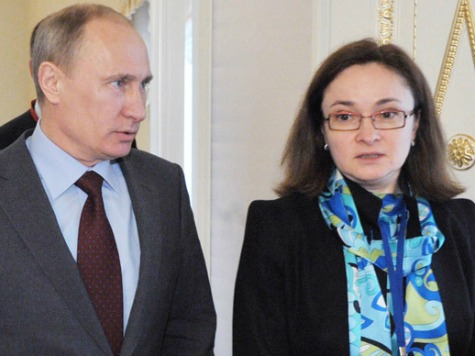Standard & Poor’s downgraded Russia’s credit rating to BBB-, just one notch above junk, and warned that the nation faced a further downgrade in the event of tighter financial sanctions by members of the North Atlantic Treaty Organization (NATO). To prevent a big drop in the exchange rate of their ruble currency, Russia’s central bank increased its benchmark interest rate to 7.5% in an effort to trim inflation.
The Central Bank of Russia raised the rate it loans to the nation’s bank by .5% following the S&P downgrade. The last time the country’s monetary authorities raised rates was in March–to 7% from 5.5%–at the start of the Ukraine crisis.
Investors concerned about the Ukrainian crisis and sanctions pulled $64 billion out of Russia in the first three months of 2014, according to S&P. Russia’s finance ministry acknowledged this week that the economy could fall into a recession in the second quarter.
The Russian Central Bank’s website cites Chair Elvira Nabiullina saying that “the adopted decision on the key rate would ensure a decline in inflation to no more than 6.0% by the end of 2014 and help to maintain the appropriate balance of inflation risks and the risks of further economic slowdown.”
The downgrade and interest rate rise came as Ukraine’s military crackdown on pro-Russian rebels in eastern Ukraine extended into a second day and concerns mounted internationally over the possibility of an invasion by the 40,000 Russian troops massed on Ukraine’s eastern border.
The Central Bank issued a downbeat assessment of the country’s economic prospects, noting that “the uncertainty of the foreign policy situation” was having a “negative impact” on output and investment.
Inflation is a top concern for policymakers as Russians suffered during previous episodes of currency devaluation and price increases in 1997-98 and 2008-09. The ruble has devalued by 9% so far this year, and core inflation is running 1% above the nation’s stated target objective of 5%.
On April 24th, U.S. Secretary of State John Kerry complained that Russia’s activities in eastern Ukraine were a “gross intimidation” to actively subvert the democratic process in its neighbor. “Russia is trying to achieve through the barrel of the gun and through the force of the mob what could not be achieved in any other way,” he said. While stopping short of announcing new sanctions, Secretary Kerry said the world was ready to act if Moscow did not take steps to de-escalate a crisis that Russia was itself stoking by ordering large-scale military exercises on the border of Ukraine earlier in the day.
From Tokyo Thursday, President Barack Obama accused Russia of failing to abide by the Geneva agreement, and he warned that new sanctions were already “teed up.”
The war of words between Moscow and Kiev intensified as Russian President Vladimir Putin warned Ukraine there would be “consequences” for using its army “against its own people.” Oleksandr Turchynov, Ukraine’s acting president, accused Russia of “coordinating and supporting terrorist killers.”
The author welcomes feedback and will respond to comments by readers.

COMMENTS
Please let us know if you're having issues with commenting.